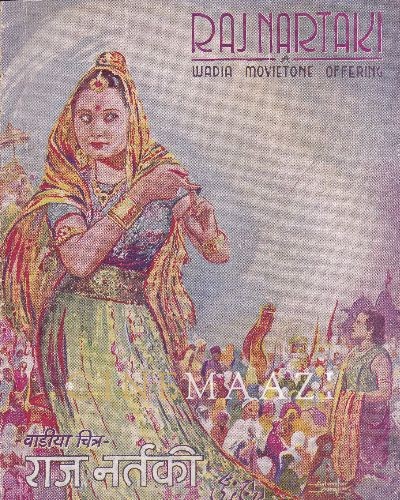Modhu Bose
Subscribe to read full article
This section is for paid subscribers only. Our subscription is only $37/- for one full year.
You get unlimited access to all paid section and features on the website with this subscription.
Not ready for a full subscription?
You can access this article for $2 , and have it saved to your account for one year.
- Born: 12 February, 1900 (Kolkata)
- Died: 25 September, 1969 (Kolkata)
- Primary Cinema: Hindi
- Parents: Kamala Dutt, Pramatha Nath Bose
- Spouse: Sadhana Bose
The pioneering work of director and actor Modhu Bose not only helped raise Indian cinema to an international level, but served as an inspiration for greats to come. With no less than 20 films to his credit as director, Bose also acted in A Throw Of Dice (1929), Prem Sanyas (1925), and Alibaba (1937), besides writing the screenplay of Raj Nartaki (1941) and Michael Madhusudhan (1950). Garnering his break in cinema via Himanshu Rai, who was working with German filmmaker Franz Osten at the time, Bose went on to handle the production and marketing of Light of Asia (1925), which became a hit. Learning to use handheld Pathe cameras, film development, and editing at Emelka Studio, Munich, Germany, he assisted Franz Osten on A Throw Of Dice (1929). As a director, Bose’s Giribala (1930) garnered considerable praise, as did the musical Alibaba (1937). Bose directorials Dahlia (1930), The Court Dancer: Raj Nartaki (1941), Michael Madhusudhan (1950) and Bireswar Vivekananda (1956) stand testimony to his immense yet largely unsung contribution to early Indian cinema.
Born 12 February, 1900 in Calcutta, Bengal Presidency, Modhu Bose was the son of Pramatha Nath Bose, a pioneering geologist and palaeontologist, and Kamala Dutt, an educationalist and founder of Kamala Girls School and daughter of historian Romesh Chunder Dutt. Schooling at the Brahmacharya Balok Bidyaloy in Bolpur, Shantiniketan, after a stint in Darjeeling, Modhu’s talent for the performing arts bagged him a role in the Tagore play Valmiki-Pratibha. However, he had to miss out on it due to his father getting transferred to Ranchi.
After studying at Bidyasagar College, Calcutta, under Sisir Bhaduri, Bose started off pursuing a series of desk jobs. He then went on to briefly work as an actor with Madan Theatres in 1923. He assisted J.J. Madan on the making of Turki Hoor (1924); assisted on Himansu Rai’s Prem Sanyas (1925), and was also hired on an internship with well-known German filmmaker Franz Osten, during which time he helped out in various departments of Osten’s film, Light Of Asia (1925), including production and marketing. The film became a moderate hit, and thus did Bose’s journey in the industry continue. Recommended by Himanshu Rai, Bose landed the opportunity to learn the use of handheld Pathe cameras, film development and editing, at the prestigious Emelka Studio in Munich, Germany. He went to London and assisted cameraman Baron Gaetano Ventigmilia on an Alfred Hitchcock film for Balcon/ Gainsborough, and also worked briefly with Karl Freund at UFA. He also shot a Burmese film for the London Film Company, Rangoon, in 1927.
Compelled to return to India due to a sudden bout of ill health, Modhu Bose diverted his attention to theatre. He started the Calcutta Amateur Players (CAP) theatre group (1927). He staged the play Prahlad, which was written by his mother Kamala Dutt, at the Globe Theatre on 7 January, 1927, followed by the play Alibaba the following year. The latter was later made into a film. Bose went on to assist Franz Osten on his second production in India, A Throw Of Dice. He was also the production manager and actor in Prapancha Pash/ A Throw of Dice (1929).
Bose’s directorial Giribala (1930), which was based on Rabindranath Tagore’s Manbhonjon, found praise particularly for its lighting, achieved despite the production drawbacks for films in India prevalent at the time. While his early films were produced by Madan Theatres, Bose made Khyber Falcon (1932) for the Punjab Film Corp. in Lahore. His best-known work was for Bombay-based Wadia Movietone and Sagar. Bose created a successful genre of Tagore’s ballets (Dahlia) and Khirode Prasad Vidyavinode’s Alibaba, which starred Bose’s wife, Sadhana Bose. His directorial Alibaba (1937) came in for recognition in India and internationally. Besides Tagore adaptations, he also directed Orientalist entertainers combining song, dance and adventure, as well as home-grown versions of 19th century British Ruritanian comedies such as Selima (1935), Kumkum (1940), and Raj Nartaki (1941). He also directed film biographicals of Michael Madhusudhan Dutt (Michael Madhusudhan, 1950), and Swami Vivekananda (Bireswar Vivekananda, 1956).
Married to actress and dancer Sadhona Bose, Bose was a pioneering filmmaker whose work contributed towards building the foundation of Indian cinema. Modhu Bose passed away in 1969 in Calcutta. His autobiography, Amar Jeeban had been published two years earlier, in 1967.
-
Filmography (6)
SortRole
-
Paradhin 1956
-
Bireswar Vivekananda 1956
-

Michael Madhusudan 1950
-

Raj Nartaki 1941
-
Selima 1935
-
Dahlia 1930
-








.jpg)



